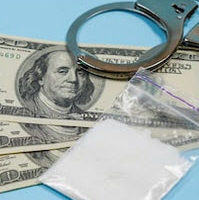Virginia State Laws Against Illegal Drug Dealing

The term illegal drug dealer tends to have a specific characterization in popular culture. The Hollywood depiction of drug dealers committing drug crimes traditionally revolves around violence, opulence, and rooms full of dirty cash. While movies and TV shows focus on these kingpins of the illegal drug trade, the legal definition of drug dealing includes a much larger cross-section of criminal offenders.
In the Commonwealth of Virginia, specifically, state law prohibits drug dealing in general terms, from street-level dealers to the aforementioned kingpin traffickers. Furthermore, Virginia state laws are broad in nature, making it unlawful to transfer, or even attempt to transfer, possession of illegal drugs. In most cases, it does not matter whether the drug dealer even received money in the exchange.
What are the Virginia Laws Against Drug Dealing?
The state laws against drug dealing appear in Code of Virginia Section 18.2-248. Under this section, drug dealing is illegal in Virginia, unless authorized to do so under the Drug Control Act. In exact terms, Section 18.2-248 prohibits any person from:
- Distributing illegal drugs;
- Giving illegal drugs;
- Manufacturing illegal drugs; or
- Selling illegal drugs.
Section 18.2-248 also prohibits any person from attempting or intending to engage in drug dealing. Under this section, it is unlawful to possess illegal drugs with the intent to distribute, give away, manufacture, or sell. Stated otherwise, even if a person does not successfully transfer possession of illegal drugs, they can still face criminal penalties under Section 18.2-248.
How Does Virginia Penalize Drug Dealing?
The Virginia penalties for drug dealing also appear in Section 18.2-248. Under this section, there are general penalties for any violation involving Schedule I or II illegal drugs, such as cocaine, heroin, or opium:
- First Conviction — The offender is guilty of a felony and subject to imprisonment for five to 40 years as well as criminal fines up to $500,000;
- Second Conviction — The offender is guilty of a felony and subject to imprisonment for five years to life as well as criminal fines up to $500,000; and
- Third or Subsequent Conviction — The offender is guilty of a felony and subject to imprisonment for ten years to life as well as criminal fines up to $500,000.
If a person deals in large quantities of illegal drugs, the criminal penalties can be even more severe. For example, an offender can face five years to life in prison and $1 million in fines if they transfer or intend to transfer:
- 10 grams or more of methamphetamine;
- 100 grams or more of heroin;
- 250 grams or more of cocaine base; or
- 500 grams or more of cocaine or coca leaves.
Do You Need Legal Help?
If you are facing charges for drug dealing or other drug crimes in Virginia, it is extremely worthwhile to reach out to a trusted criminal defense attorney. The attorneys at Simms Showers LLP, servicing Leesburg, Winchester, Fairfax, and Manassas, have multifaceted experience with drug crimes in Virginia as well as other facets of criminal defense. If you need criminal defense, contact us today for a free initial consultation.
https://www.simmsshowerslaw.com/the-safe-reporting-of-overdoses-in-virginia/
